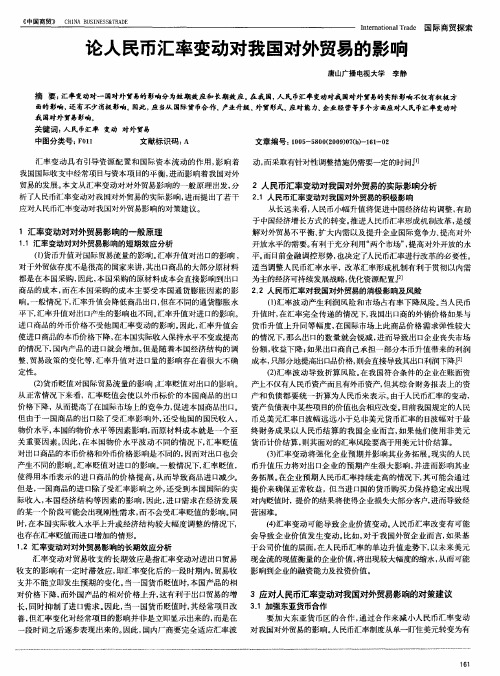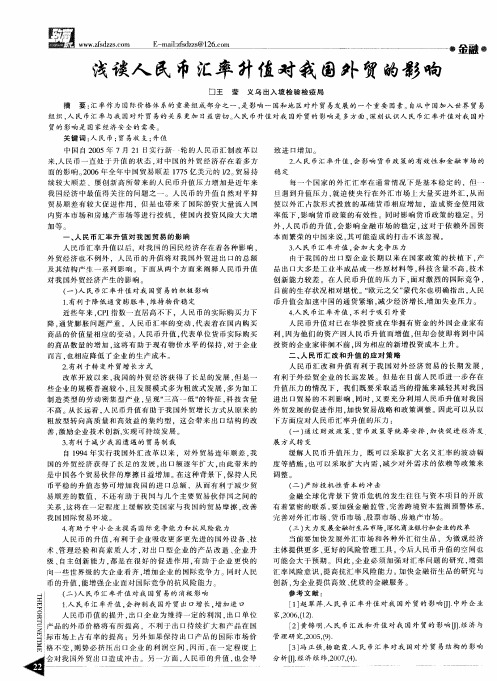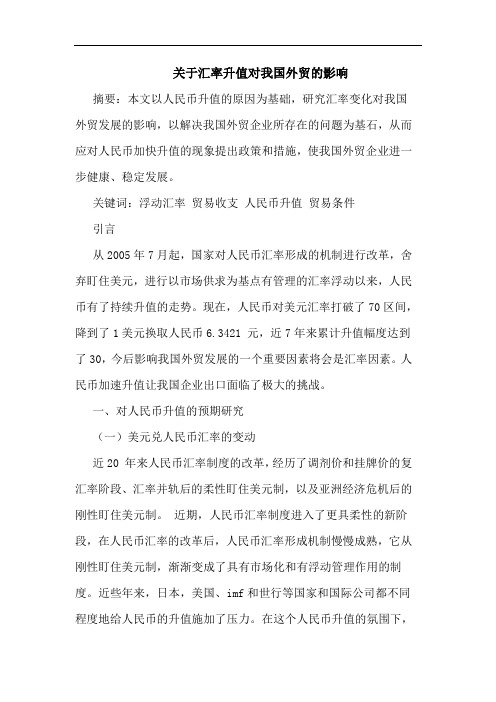人民币汇率变动对我国外贸的影响
- 格式:docx
- 大小:37.08 KB
- 文档页数:2

汇率变动对进出口贸易的影响本文旨在探讨汇率变动对进出口贸易的影响。
随着全球经济的不断发展,汇率波动对进出口贸易的作用日益显著。
本文将首先确定文章主题,然后对汇率变动对进出口贸易的影响进行详细分析,并通过实际案例进一步说明汇率变动的作用,最后得出结论。
本文的主题为“汇率变动对进出口贸易的影响”。
汇率是指一国货币相对于其他国家的价值,汇率变动会引起进出口商品和服务的价格变化,从而影响国际贸易。
本文将重点分析汇率变动对进出口贸易的影响机制和实际案例。
汇率变动会导致进出口商品和服务的价格发生变化。
当本国货币贬值时,出口商品价格相对升高,进口商品价格相对降低。
这有利于促进出口,抑制进口。
相反,当本国货币升值时,出口商品价格相对降低,进口商品价格相对升高,有利于抑制出口,促进进口。
汇率变动也会引起贸易量的变化。
在价格变动的基础上,进出口商可能会调整贸易量以适应新的市场环境。
当本国货币贬值时,出口商可能会试图扩大出口规模,以赚取更多外汇;而进口商可能会减少进口,以避免货币贬值带来的成本增加。
反之,当本国货币升值时,出口商可能会减少出口,以避免货币升值带来的收益减少;而进口商可能会增加进口,以利用货币升值的购买力优势。
汇率变动还会影响进出口竞争力。
本国货币贬值有利于提高出口商品的竞争力,促进出口;而本国货币升值则有利于提高进口商品的竞争力,促进进口。
这种竞争力的变化会影响到国际贸易的格局和各国经济的发展。
以日本和美国为例,假设日元对美元贬值,则出口日本商品的价格相对于美国消费者而言升高,从而抑制日本对美国的出口。
同时,由于日元贬值,日本进口商品的价格相对降低,有利于日本扩大进口规模。
因此,日元对美元贬值会对日本进出口贸易产生复杂影响。
具体来看,日元贬值使得日本出口商品价格升高,导致美国消费者购买日本商品的数量下降,对日本出口造成压力。
然而,日元贬值也使得日本从美国进口商品的价格降低,有利于日本增加从美国的进口。


人民币汇率波动及其对外贸易的影响研究随着中国的崛起和国际贸易的日益频繁,人民币汇率成为了备受关注的话题。
作为全球第二大经济体的中国,其汇率政策改革和人民币汇率走势,必然对国际贸易造成一定的影响。
本文将从汇率波动的原因、影响因素以及对外贸易的影响三方面进行分析。
一、人民币汇率波动的原因人民币汇率波动的原因虽然多种多样,但可以归纳为三个方面,即国际环境的影响、国内政策的调整、市场供求的变化。
首先,国际环境对人民币汇率的影响不可忽视。
例如,美国的贸易保护主义政策和美元的强势,都会对人民币汇率造成影响。
其次,国内政策的调整也是人民币汇率波动的重要因素。
例如,人民银行通过调整存款准备金率、货币政策利率等手段来影响汇率波动。
再次,市场供求的变化直接影响到汇率波动。
当市场需求大于供给时,人民币就会升值;当市场供给大于需求时,人民币就会贬值。
二、人民币汇率波动的影响因素人民币汇率波动的影响因素有多个,主要包括经济和政治方面的因素。
首先,经济方面的因素主要包括出口和进口的影响、国际投资和资本流动的影响等等。
其次,政治方面的因素对人民币汇率波动同样产生影响。
例如,美国政府对中国的贸易政策、中国与其它国家的经济关系等等都会对人民币汇率产生影响。
三、人民币汇率波动对外贸易的影响人民币汇率波动对外贸易有着显著的影响。
首先,人民币升值对出口企业不利,因为人民币升值会使得外国货币购买中国产品更加昂贵,导致出口成本增加,进而影响出口产品的竞争力。
其次,人民币贬值则会增加进口成本,导致进口价格上升,对减少本国资源和能源消耗产生不利影响。
此外,完全自由化的人民币汇率体制可能引起汇率波动,进而导致的价格不稳定也会对外贸企业造成困扰。
综上所述,人民币汇率波动对外贸企业的影响非常重要,需要企业家关注和政府调控。
政府应该协调人民币汇率,保持适当的汇率稳定性;同时,出口企业应积极适应汇率变化,加强科技创新和研发,提高产品质量,降低成本;进口企业则应该制定合理的购买策略,缩小与外国货币的汇率风险。


关于汇率升值对我国外贸的影响摘要:本文以人民币升值的原因为基础,研究汇率变化对我国外贸发展的影响,以解决我国外贸企业所存在的问题为基石,从而应对人民币加快升值的现象提出政策和措施,使我国外贸企业进一步健康、稳定发展。
关键词:浮动汇率贸易收支人民币升值贸易条件引言从2005年7月起,国家对人民币汇率形成的机制进行改革,舍弃盯住美元,进行以市场供求为基点有管理的汇率浮动以来,人民币有了持续升值的走势。
现在,人民币对美元汇率打破了70区间,降到了1美元换取人民币6.3421 元,近7年来累计升值幅度达到了30,今后影响我国外贸发展的一个重要因素将会是汇率因素。
人民币加速升值让我国企业出口面临了极大的挑战。
一、对人民币升值的预期研究(一)美元兑人民币汇率的变动近20 年来人民币汇率制度的改革,经历了调剂价和挂牌价的复汇率阶段、汇率并轨后的柔性盯住美元制,以及亚洲经济危机后的刚性盯住美元制。
近期,人民币汇率制度进入了更具柔性的新阶段,在人民币汇率的改革后,人民币汇率形成机制慢慢成熟,它从刚性盯住美元制,渐渐变成了具有市场化和有浮动管理作用的制度。
近些年来,日本,美国、imf和世行等国家和国际公司都不同程度地给人民币的升值施加了压力。
在这个人民币升值的氛围下,中国企业的国外项目的汇率风险管理也将面临着重大的挑战。
对于中国企业的国外项目来说,每个国家的当地货币以及美元是重要的记账货币和职能性货币,但是因为中国企业仍然有很多以人民币为结算货币的大型交易,并且最终都是在中国境内交易的,企业的报表货币都是人民币,于是人民币的汇率波动会给中国企业的国外项目带来很大的风险。
(二)人民币加快升值的原因1、政策原因。
由于我国政府为对付通货膨胀所采取一些如加息等调控方式而导致了人民币升值速度加快,也就是所谓的控制流动性过剩,而主要原因并不是各国给予我国的压力。
在经济学的一般理论中,我们都认为控制汇率上升速度和控制通胀两者不可能同时得到。

人民币汇率对我国外贸的影响摘要近年来,人民币汇率问题不断成为国际热点。
2005年汇改后,人民币汇率的双向浮动也基本实现了。
从理论上来说,汇率波动对外贸的影响,要考虑到马歇尔一勒纳条件和时间效应。
从实证数据来看,人民币汇率波动对我国外贸收支的平衡影响不大,但是,这种度动有助于改善我国的外贸条件。
关键词人民币汇率;马歇尔一勒纳条件;j曲线效应中图分类号f752 文献标识码a 文章编号1001-828x(2011)03-0073-02一、背景人民币对西方主要货币的汇率于1949年1月18日首先在天津产生。
从1949年到1950年,人民币汇率的制定以“奖出限入、照顾侨汇”的方针,按照大宗出口商品的加权平均换汇成本、出口商品理论比价、进口商品理论比价和侨汇购买力,再按照国际平均相对价格水平的变化和国内经济恢复程度进行了调整。
改革开放后,我国经济改革实行的是双轨制的过渡方式,人民币汇率也是如此。
1981年到1984年,人民币汇率实行的是双重汇率的体制。
第一次汇改后,从1994年1月1日起,我国实行了以供求为基础的、单一的、有管理的浮动汇率制,实现了人民币的并轨,人民币在并轨后呈小幅上浮趋势,由1994年的8.62元人民币/1美元升值到2004年8.2765元人民币/1美元。
在这十年里,我国对于人民币汇率一直执行的是“盯住美元”的策略,这一策略使得人民币汇率在这段期间一直保持稳定,对我国外贸部门的发展起到了重要的作用。
加入世贸后,我国对外贸易的发展进入了一个新的阶段,外贸呈现出蓬勃发展的势头,贸易顺差和外汇储备迅猛增长。
我国2004年的进出口贸易额与2003年相比增加了35.7%,达到11547.4亿美元,成为世界第三贸易国。
进出口顺差高达319.8亿美元,同比增长25.6%。
截至2005年6月中国外汇储备已达到7109.73亿美元,仅次于日本。
伴随着贸易顺差和外汇储备的增长,发达国家特别是美国要求人民币升值的压力也与日俱增。
外文资料译文论文题目人民币汇率升值对我国外贸的影响分析专业国际经济与贸易班级姓名学号指导教师职称2012 年 1 月 3 日The impact of RMB exchange rate appreciation to our economy and the foreign tradeThis paper analyzes the causes of RMB exchange rate appreciation, expounds the beneficial effects, adverse effects on our coun-try's economic and foreign trade, and puts for-ward the countermeasures to the effects.Present situation of Chinese foreign trade surplus continues to expand, which is caused by a variety of reasons. The appreciation of RMB exchange rate on China's economy, foreign trade import and export volume and structure have a series of effects, only to take positive and effective measures to make the economy of our country and export enterprises to obtain the sustainable and stable development.1. reasons for the appreciation of the RMB exchange rate1.1 Chinese and foreign interest rate differenceInterest rate policy is an important tool of monetary policy. The rate of relative height will affect the capital flow direction is one of the important ways, high interest rates will stimulate the international capital inflow, and reduce its outflow of funds. Thus affecting the scale of international trade, make the difference of interest rate on exchange rate influence the trend of continuous improvement.1.2 Money supply situationRMB exchange rate and China's money supply substantiallypositive correlation, due to the deepening of reform and opening up, foreign investors can not only make use of cheap Chinese labour, more optimistic about China's huge domestic market. Therefore, foreign investment increased substantially. Due to tightening of monetary policy, the RMB fund is quite nervous, the entry of foreign capital and foreign exchange, so appeared apparent oversupply, resulting in the trend of Renminbi rmb.1.3 International balance of payments and foreign exchange reserveThe formation of foreign exchange market and the international trade and investment is not divided, international balance of payment is a country's foreign economic activities of the various payment sum. Under floating exchange rates, the market supply and demand to determine the exchange rate changes, therefore international payments deficit will lead to the devaluation of the currency, the foreign currency appreciation, namely the exchange rate rise. Conversely, international payments surplus caused a decline in foreign exchange rates.1.4 Economic growthA country's economic take-off stage, due to the low level of productivity, economic development performance for the extensive mode of operation, and thus their own currency exchange rate decreased, i.e.. A country's economy is relatively mature stage, consumer demand as income and growth, but the growth that consumes demand to catch the output supply growth, so in the period of rapid economic growth, supply relative consumption demand, so asto have a downward pressure on prices.2. The exchange rate of RMB appreciation on China's economy and foreign trade favourable effects2.1 Be helpful for Chinese enterprises to "go out"The appreciation of the renminbi means that Chinese enterprises to invest abroad cost relatively drops than before, which makes them to lower the cost of the establishment of multinational companies. So it is beneficial to the Chinese enterprises to "go out", to create a truly international competitiveness of Chinese transnational corporation. 2.2 Will help improve trade conditionsThe appreciation of the renminbi, export prices higher, you can use less export products in return for their own needs a variety of products. Export profit increases ceaselessly, can improve our terms of trade.2.3 Conducive to reduce external debt debt service pressureThe rise in the renminbi exchange rate, outstanding debt servicing required the amount of local currency is correspondingly reduced, to a certain extent so as to reduce the burden of external debt.2.4 Conducive to promoting the transformation of foreign trade growth modeThe appreciation of the renminbi has contributed to China's foreign trade growth mode from extensive original shift quality and cost-effective intensive, this will bring the improvement of export structure, encourage technological innovation, sustainable development.2.5 Conducive to lower import costsAfter revaluation, the price of imported goods will have the same magnitude of decline, reducing our cost of imports and import fees paid. The appreciation of the renminbi will make large transaction costs of imports, so as to improve the profit situation of related industries, to economy construction is very favorable.2.6 Be helpful for improving the environment of attracting foreign investmentThe appreciation of the RMB exchange rate, can make have foreign-funded enterprises in China increased profits, so as to enhance the confidence of investors, to further increase investment or investment; the appreciation of the RMB exchange rate will attract a lot of foreign capital into China 's capital market, indirect investment proportion will be increased further.3. The exchange rate of RMB appreciation on China's economy and foreign trade adverse effects3.1 The influence of Chinese enterprise and many integrated competition ability of the industryThe appreciation of the renminbi will lead to certain technical content and added value is low, poor management, high cost and low efficiency of export enterprises lose in the price in the international market competitive advantage, eventually had to be eliminated.3.2 Increasing employment pressureRMB appreciation will restrain or hit exports, will ultimatelyaffect the employment. In the current China's employment situation is extremely grim situation, the appreciation of the RMB exchange rate will be worse employment situation.3.3 The agriculture of our country will face greater challengesThe appreciation of the renminbi will block trade of China's agricultural products export growth, import will increase apparently, production of our country agriculture will cause impact, influence farmer to add close. Import and export trade of agricultural products could be reversed, with surplus to deficit.3.4 The impact of the financial market stabilityChina financial market development lags behind relatively, the appreciation of the renminbi will be a large number of short-term capital flows into the capital market through various channels, the profit-seeking behavior, easily lead to monetary and financial crisis, the Chinese economy will be sustained and healthy development causes adverse effect.3.5 Weaken China's export growthThe appreciation of the renminbi, China's manufacturing industry in the global competition will gradually disappear, easy manufacturing overseas. The value of the renminbi, export enterprises to maintain a certain profit, the export unit of foreign currency prices will increase, not conducive to exports continued to expand and in the international market share increase.3.6 Export growth is restricted to the export enterprises, bring a lossThe appreciation of the renminbi, if China's export commoditiesdenominated in foreign currency prices unchanged, requires the export commodities denominated in Renminbi price decline, in this way, China's exports will not be affected, but our country enterprise 's profit fell by.3.7 Not conducive to attracting foreign investment in ChinaThe appreciation of the renminbi to processing trade of foreign enterprises export cost increase, so that the processing trade of the foreign investment decline. This will affect foreign investment enterprises,Profit to investment scale and industry localization process, is not conducive to China 's processing trade industry sustainable development, upgrade.4. In view of the appreciation of the RMB exchange rate on China's economy and foreign trade 's influence, proposed countermeasures 4.1 Develop an international market energetically?In order to future export trade, long-term development? In addition to continue to consolidate and further develop the traditional American, Japanese, European market?, enterprises should also actively looking for and open up new target markets, such as Africa, ASEAN and other potential huge market, promote the diversification of the market, enterprises to expand exports, to the export enterprises to bring new profit source.4.2 To alleviate the pressure of RMB appreciationWe can adjust the foreign trade structure to reduce the reliance onthe American market. In view of capital inflow pressures, continue to encourage the inflow of foreign capital in the. According to the rapid growth of foreign exchange reserves has brought the pressure, we can take measures to appropriate control of its growth rate, as the gradual adjustment of the RMB exchange rate level and lay the foundation for.4.3 Improve product quality, create their own brandIn order to improve the export products in the international market competition, China's export enterprises to deal with the RMB appreciation is another key measures to realize the upgrading of products, to build their own brands, from to the price advantage competition to quality and brand and price advantage to participate in international competition.4.4 Change the mode of growth of export tradeThe new technology, new energy, new materials and other high-tech penetration into traditional industries to them, so that our export products by labor concentrated model, resource intensive to high technology content, the degree of processing depth, high value-added new products. And to the development of high-tech industry.4.5 Timely adjustment of exchange rate and exchange rate systemWe should realize the adjustment of the RMB exchange rate policy, successfully, for the future of the stability of macro economy, trade and Industry Department trade departments the balance between development and sustainable economic growth in China have a profound and positive significance. And this, to be on the governmentto take decisive measures, eliminate the appreciation expectation.4.6 Reduce production and transaction costThe export enterprises may through strengthen management, straighten out the internal process, reduce the management cost; using the appreciation of the renminbi, increase the import raw materials from abroad, to reduce the material cost; direct contact with foreign or make full use of the Internet to the development of electronic commerce, export less intermediate links, improving the trading efficiency, reduce transaction costs.Authors: Aaron Johnson, 《The impact of RMB exchange rate appreciation to our economy and the foreign trade》2009.08浅谈人民币汇率升值对我国经济及外贸的影响本文分析了人民币汇率升值的原因,阐述了人民币汇率升值对我国经济及外贸的有利影响、不利影响,并针对人民币汇率升值对我国经济及外贸的影响,提出了对策。
浅谈人民币升值对我国外贸行业的影响摘要:本文在分析人民币持续升值原因的基础上,探讨了人民币升值对我国对外贸易的影响,同时又指出了在人民币升值背景下,我国外贸行业所面临的问题,以及政府为了应对人民币升值所制定的有利于出口企业发展的对策。
最后,本文总结经验并制定符合我国具体国情的货币政策。
关键词:人民币持续升值;对外贸易;对策中图分类号:f752文献标识码:a 文章编号:1001-828x(2011)10-0110-01一、人民币汇率生成机制及现状(一)人民币汇率对外贸出口和吸引外资进入方面的影响汇率是构成商品价格主要因素,外贸出口的基本格局决定着价格对出口的影响程度,进而决定汇率波动对外贸出口的影响。
我国出口商品的价格特点主要有:1.出口商品的价格弹性较小,但价格和规模的竞争激烈。
我国初级产品出口还占10%左右的比重,大量的出口集中在劳动密集型产品和初级的资金和技术密集型产品,由于国际市场同类产品竞争较为激烈,价格仍然成为出口竞争的主要因素。
2.进出结合的出口方式占重要地位。
加工贸易出口的比重较大,2002年加工贸易出口占全国出口的55.3%。
加工贸易“两头在外,出口和进口直接挂钩,出口目的地较为明确,价格也较为稳定。
”中国引进的外资中有很大一部分属于对出口导向型企业的投资,不少人担心人民币升值将提高中国的生产成本,从而削弱其对外资的吸引力和出口产品的价格竞争力。
(二)人民币升值的主要因素1.国际形势的压力。
我国作为世界经济大国,人民币汇率问题不仅是单纯的经济问题,更是复杂的国际政治问题。
一些西方国家更是附和美国频频呼吁人民币升值,当然他们的目的不尽相同,有的是出于嫉妒,有的是为了转移国内对当局的指责,有的则是为了争取国内制造业的选票。
2.人民币币值长期被低估。
长期以来,我国人民币实行盯住单一美元的固定汇率制度,人民币相对美元一直处于被低估的状态。
布雷顿森林体系瓦解后,由于美元发行不受约束以及采取的低利率政策,致使美元在全球的供给过剩,给美元带来一定的负面影响。
International Trade国际商贸2102012年4月 人民币汇率波动对我国进出口贸易的影响分析力帆实业集团汽车销售有限公司 廖雄辉摘 要:自中国央行宣布于2010年6月19日重启汇改之后,人民币汇率波动对我国进出口贸易所造成的影响,再次引起了社会各方的广泛关注。
本文主要基于1995年第4季度到2009年第4季度的数据,运用了Engle-Granger两步法,针对人民币汇率波动对我国进出口贸易造成的影响进行了分析。
关键词:人民币汇率波动 进出口贸易 实证分析中图分类号:F724 文献标识码:A 文章编号:1005-5800(2012)04(c)-210-02世界各国的货币币值不一样,名称不一样,当一国货币需要兑换另一国货币时,必须要规定一个兑换率,这就是我们通常所说的汇率。
随着世界经济一体化趋势的加强,以及资本市场的快速发展,汇率已经不单单是兑换率那么简单,它在某种程度上决定了一个国家产品及服务在国际市场上的竞争力,并且它已经成为一个国家重要的宏观经济变量,因此,人民币汇率的波动会对我国进出口贸易产生重要影响。
2005年我国汇率制度改革以前,主要采取的是“钉住美元”的汇率制度,人民币的汇率波动并不是很多。
这一时期,我国学者研究的重点是放在汇率变动对国际贸易收支影响的层面上,也就是马歇尔——勒纳条件、“J 曲线效应”能够适用于中国这一问题上,关于人民币汇率波动对我国进出口贸易影响的研究还不是很多。
但是,自2005年7月21日起,我国开始实施以市场供求为基础,参考一篮子货币进行相应的调整,这样就使人民币汇率有了更大的浮动空间。
在这种环境下,人民币汇率的波动幅度将会增加,必然会对我国的进出口贸易产生重大影响。
我们知道,作为拉动GDP 增长的“三驾马车”之一的出口,一直都是推动我国经济快速增长的主要动力。
2010年1月,我国海关总署所出具的对外贸易统计资料表明,我国的出口量已经超过了德国,成为世界最大的贸易出口国。
美元兑人民币汇率上涨对中国进出口贸易的影响分析
1. 出口商品价格上涨:当美元兑人民币汇率上涨时,中国以美元计价的出口商品价
格会上涨。
这意味着同一件商品需要花费更多的人民币购买,对外国买家来说,中国的出
口商品变得更昂贵,可能导致需求上的减少。
中国的出口企业可能会面临更加竞争激烈的
市场环境,并需降低出口商品的价格竞争力。
2. 进口成本增加:美元兑人民币汇率上涨还意味着以美元计价的进口商品对于中国
来说成本增加。
这将导致中国企业购买进口原材料、设备和技术更加昂贵,可能对中国的
生产成本造成一定的影响。
特别是对于依赖进口原材料和零部件的产业,如制造业等,进
口成本的增加可能会导致企业面临更大的经营压力。
4. 投资风险增加:中国的外贸企业通常会与外国企业签订长期合同,以锁定汇率和
价格。
当美元兑人民币汇率上涨时,这些合同的风险将增加。
汇率波动可能会导致中国企
业在合同期内利润减少或亏损。
中国的外贸企业可能需要制定更好的风险管理策略,以应
对汇率风险。
5. 对外债务影响:中国企业和政府通常会融资于国际市场,以发行债券和借贷等形式。
当美元兑人民币汇率上涨时,中国企业和政府需要花费更多的人民币来偿还美元债务。
这会增加其债务负担,可能对中国的金融稳定造成一定的压力。
美元兑人民币汇率上涨对中国进出口贸易产生了负面影响。
这需要中国的企业和政府
采取相应的措施来应对汇率波动和降低对外贸易的不利影响,例如通过提高产品的附加值、提高技术含量和创新能力,寻找其他市场等。
人民币汇率变动对我国外贸的影响
随着我国外贸发展日益壮大,人民币汇率变动已经成为了一个备受关注和重要的问题。
汇率变动不仅可以影响企业的盈利能力,而且还可以影响整个外贸行业的生态环境。
本文将从多个方面探讨人民币汇率变动对我国外贸的影响。
一、出口企业
对于出口企业来说,人民币汇率的升值会导致出口商品的成本增加,原材料进口成本增加,产品售价降低,这会直接影响企业的利润。
与此相反,人民币汇率的贬值会导致出口商品价格降低,吸引更多的海外买家,提高出口额和利润。
因此,企业需要密切关注汇率变动,并及时采取有效措施来适应市场变化。
二、进口企业
对于进口企业而言,汇率变动也会对其业务产生影响。
人民币汇率升值会使进口商品价格降低,减少成本,提高利润。
与此相反,汇率贬值会导致进口商品价格增加,增加成本。
此时,进口企业需要及时调整进口策略,寻求新的采购渠道和减少进口成本。
三、外贸市场
人民币汇率升值会使我国出口商品变得更加昂贵,进口商品更加便宜,这会影响我国出口企业的竞争力,在竞争激烈的国际市场中处于不利地位。
但是,当人民币汇率贬值时,我国出口商品价格变得更加具有竞争力,成为国际市场上的热点。
这也说明在市场变化中,人民币汇率变动“利大于弊”,会为出口企业带来更多的机会。
四、外汇储备
人民币汇率升值会降低我国总出口额,并导致外贸过程中的财政赤字,同时会增加货币流入国外,使我国外汇储备下降。
人民币汇率贬值则会带来更多的外汇储
备,并加强对外贸系统的稳定性。
然而,应该注意的是,外汇储备太过庞大也会有一定的风险,过度依赖外汇储备也会对国家经济产生不利影响。
短期内,人民币汇率的变动可能会对我国外贸业造成波动,但长期来看,它也为我国外贸业提供了更多机会和竞争力。
在面对汇率波动时,企业要及时制定相应的应对策略,以降低风险和提高竞争力。
同时,政府也应监控和有针对性地调控汇率波动,以推动我国外贸行业的发展。